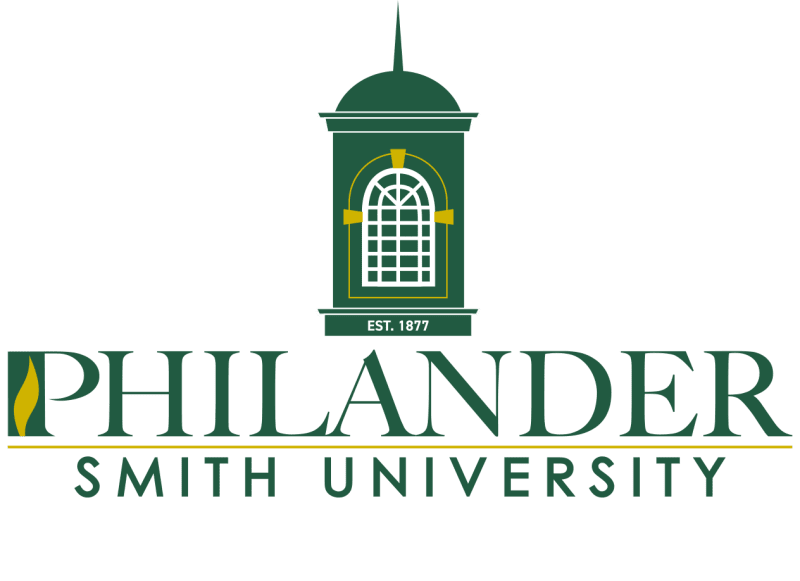Please find below the most recent academic catalog.
Policies and Procedures
Philander Smith University's assignment and award of credit hours conform to widely accepted practices in higher education. A credit hour is an institutionally established equivalency that “assigns a unit of measure that gives value to the level of instruction, academic rigor, and time requirements for a course taken at an educational institution.” Philander Smith University observes the following minimum time requirements for courses:
Calculations for an 8-week course:
| Credit Hours | Minimum Assigned Instructional Minutes per class session | Direct Instruction Hours | Student Work Hours | Total Course Hours |
| 1 | 50 minutes | 15 | 30 | 45/8- weeks |
| 2 | 100 minutes | 30 | 60 | 90/8- weeks |
| 3 | 150 minutes | 45 | 90 | 135/8- weeks |
| 4 | 200 minutes | 60 | 120 | 180/8- weeks |
| 5 | 250 minutes | 75 | 150 | 225/8- weeks |
| 6 | 300 minutes | 90 | 180 | 270/8- weeks |
| 7 | 350 minutes | 105 | 210 | 315/8- weeks |
Calculations for a 16-week course:
| Credit Hours | Minimum Assigned Instructional Minutes per class session | Direct Instruction Hours | Student Work Hours | Total Course Hours |
| 1 | 50 minutes | 15 | 30 | 45/16- weeks |
| 2 | 100 minutes | 30 | 60 | 90/16- weeks |
| 3 | 150 minutes | 45 | 90 | 135/16- weeks |
| 4 | 200 minutes | 60 | 120 | 180/16- weeks |
| 5 | 250 minutes | 75 | 150 | 225/16- weeks |
| 6 | 300 minutes | 90 | 180 | 270/16- weeks |
| 7 | 350 minutes | 315/16- weeks |
Calculations for Clinical/Practicum/Internship/Lab:
| Clinical | 40 work hours = 1 credit hour |
| Practicum | Variable 20-40 observation hours = 1 credit hour |
| Internship | 40 works hours = 1 credit hour |
| Lab | 30 contact hours = 1 credit hour |
Academic Grievance for Students: Appealing a Grade
Appeals and grievances of this nature should be handled swiftly while fresh in the minds of the students and faculty member.
If a student is dissatisfied with the grade recorded by an instructor, he or she shall follow these steps:
- The student must appeal the grade within the following time frame:
- If appeal is for grade received in the fall semester, appeal must be made by the end of the midterm week in the following spring semester
- If appeal is for grade received in the spring or summer semesters, appeal must be made by the end of the midterm week of the following fall semester.
- The student and the instructor shall discuss the grade in
- If a satisfactory resolution is not achieved in Step 1, the student may seek resolution with the chairperson of the academic division in which the course is taught.
- If a satisfactory resolution is not achieved in Step 2, the student may appeal to the Vice President for Academic Affairs, whose decision shall be final on the matter. NOTE: At appeal Steps 2 and 3, the student shall make the appeal in writing, copies of which shall be given to the instructor, the division chairperson, and the Vice President for Academic Affairs.
Students who have already followed steps 1 and 2 in completing Appealing a Grade and Appealing Perceived Unfair Treatment forms and who wish to appeal to the Vice President for Academic Affairs will submit a one-page summary of their complaint to the Vice President. The official date of the complaint will be stamped on the document and a copy given to the student. Within 30 days, the Vice President for Academic Affairs will provide a written response and final decision. In the meantime, the Vice President may meet with the student to gather additional information.
Communication from third parties will not be accepted unless requested by the Vice President for Academic Affairs. The Vice President may also request information from other parties as deemed necessary.
Within the written complaint, the student will provide the following information:
- A concise statement of the nature of the academic complaint;
- A timeline to illustrate key points in the complaint;
- A specific request regarding an expected resolution; and
- Any additional information to be considered in the grievance, including
In cases in which the Vice President for Academic Affairs considers it necessary, the Vice President for Academic Affairs may convene an ad hoc academic grievance advisory committee composed of faculty and staff who are not a part of the complaint. This committee will provide a written response to the Vice President for Academic Affairs within 30 days, unless the complainant is informed that more time is needed to gather information. In such cases, the President will receive a progress report.
As the sections above indicate, the decision of the Vice President for Academic Affairs regarding an academic grievance appeal will be final.
An appeal may be made to the President only for the following reasons:
- Perceived violations of college policies versus practices; or
- Threats to safety of
At the President’s discretion, the President may convene a hearing between the student and other identified parties to provide additional information. During this time, the student may bring up to two persons to the hearing, neither of whom shall be legal counsel. These persons will not have voice but can be present to support the complainant. The President reserves the right to establish a process for the hearing in order to interpret the college’s policies and to gather additional information. During this grievance process, the President and Vice President for Academic Affairs will direct all inquiries to the student filing the complaint. The college’s response to correspondence from parents and other parties will be held until the conclusion of a hearing when a decision has been rendered. All decisions of the President are final.
Academic Grievance for Student: Appealing Perceived Unfair Treatment
If a student has evidence that he or she has been treated unfairly by an instructor, the student shall follow Steps 1, 2, and 3 as given in the process for “Appealing a Grade.”
In cases in which the Vice President for Academic Affairs considers it necessary, the Vice President for Academic Affairs may convene an ad hoc academic grievance advisory committee composed of faculty and staff who are not a part of the complaint. This committee will provide a written response to the Vice President for Academic Affairs within 30 days, unless the complainant is informed that more time is needed to gather information. In such cases, the President will receive a progress report.
As the sections above indicate, the decision of the Vice President for Academic Affairs regarding an academic grievance appeal will be final.
An appeal may be made to the President only for the following reasons:
- Perceived violations of college policies versus practices; or
- Threats to safety of
At the President’s discretion, the President may convene a hearing between the student and other identified parties to provide additional information. During this time, the student may bring up to two persons to the hearing, neither of whom shall be legal counsel. These persons will not have voice but can be present to support the complainant. The President reserves the right to establish a process for the hearing in order to interpret the college’s policies and to gather additional information. During this grievance process, the President and Vice President for Academic Affairs will direct all inquiries to the student filing the complaint. The college’s response to correspondence from parents and other parties will be held until the conclusion of a hearing when a decision has been rendered. All decisions of the President are final.
Academic Student Grievance: Retroactive Withdrawal
When circumstances of a serious and compelling nature prevent the completion of course work, or extenuating circumstances prevent regular withdrawal by the deadline on the Academic Calendar, the student may have cause to petition for a Retroactive Withdrawal. The request must be made by the following semester.
Examples of circumstances of a serious and compelling nature or examples of extenuating circumstances would include, for instance:
- There was a documented administrative error that affected student enrollment in one or more courses
- There is documentation of a serious illness that affected student’s ability to complete all the coursework after the withdrawal date
- The student can document extreme and unusual circumstances which a) were beyond the control of the student; b) occurred after the withdrawal date; and c) could not have been addressed during the term in which the course(s) was taken.
The circumstances that are not of a serious and compelling nature and that are not of extenuating circumstances would include, for instance, the student:
- Is petitioning because he or she is not satisfied with the grade earned
- Is petitioning because he or she neglected to formally withdraw from the course(s) in question
- Was not aware of the withdrawal deadlines
- Changed his or her major and is now working towards a major or degree that does not require the course(s) in question
- Has had non-academic activities which restricted the student’s time for academic pursuit
- Was ill or suffered stress as the result of an accident, death, family crisis, or other crisis early enough in the semester to have withdrawn during the semester
Student Life and Student Affairs Complaint Process
The Division of Student Affairs at Philander Smith University is committed to maintaining a respectful and supportive environment for all students. We value your feedback and strive to address concerns in a fair and timely manner. If you encounter issues related to housing, safety and security, campus organizations, or interactions with other students, the following complaint process has been established to ensure your concerns are heard and resolved:
- Identify the Issue
- Before filing a complaint, students should attempt to resolve the issue directly with the relevant department or individual when possible. This may include reaching out to housing staff for concerns related to your living space, or speaking with student organization leaders for issues regarding clubs and activities.
- File a Formal Complaint
- If the issue cannot be resolved directly or informally, you may file a formal complaint with the Division of Student Affairs. To do so:
- Submit a Complaint Form: Complete the Student Affairs Complaint Form available on the university website or at the Student Affairs office.
- Provide Detailed Information: Be sure to include a description of the issue, the individuals or departments involved, any steps already taken to resolve the matter, and the desired outcome. Please include any supporting documentation or evidence that may help in addressing your concern.
- Submit the Form: You can submit the complaint form electronically or in person at the Student Affairs office.
- Complaint Review
- Once submitted, your complaint will be acknowledged within 2 business days. The Division of Student Affairs will review the details of your complaint to assess the situation.
- Initial Response: You will receive an initial response within 5 business days, outlining the next steps and the timeline for resolution. If more information or clarification is needed, you may be contacted for further details.
- Investigation and Resolution
- The Division of Student Affairs will investigate the issue fairly and impartially, consulting with relevant individuals or departments as necessary. This process may take up to 10 business days, depending on the complexity of the issue.
- You will be notified of the outcome of the investigation, including any actions taken or steps for resolution. If the issue is resolved, you will be informed of the steps that have been implemented.
- Escalation Process
- If you are dissatisfied with the outcome or feel that your concern has not been adequately addressed, you may request an escalation of the complaint to the Chief Student Affairs Officer or another designated senior administrator. The request for escalation should be made in writing within 5 business days of receiving the initial resolution.
- The senior administrator will review the case and provide a final response within 10 business days.
- Confidentiality and Non-Retaliation
- All complaints will be handled with confidentiality to the greatest extent possible, and your privacy will be respected throughout the process.
- The university maintains a strict non-retaliation policy. Students who file complaints in good faith will not face retaliation in any form for doing so.
- Feedback and Continuous Improvement
- Upon resolution of the complaint, students will have the opportunity to provide feedback on the complaint process and the outcome. This feedback is valuable for ongoing improvements in student services and the overall student experience.
For any questions or assistance regarding the complaint process, please contact the Division of Student Affairs at rlovelace@philander.edu or 501.370.5297.
Philander Smith University articulation agreements can be found via this online pdf.
Transfer Credits
A transfer student is defined as any student who has been officially enrolled at another college or university. All transfer students must be in good standing with all schools previously attended and complete all admission requirements. Students must have a cumulative GPA of at least 2.0. Any student who has earned fewer than 30 credit hours will be admitted as a freshman.
Semester credit hours of all courses earned at an accredited four-year institution will be accepted and added to credit hours earned at Philander Smith College. It is the student's responsibility to get approval from the department and the registrar before classes are added to the official transcript. In addition, only 62 semester credit hours for courses passed at an accredited two-year college will be accepted and added to credit hours earned at PSC. Transfer students are required to maintain satisfactory academic progress and must complete 22 of the last 32 credit hours at Philander Smith College. Only grades earned at PSC will be used to calculate the GPA (except as noted in catalog pertaining to graduation honors and organizations; see below).
Students currently on academic probation from another institution of higher learning may be admitted to PSC on a probationary basis. These students may not enroll for more than 12 credit hours per semester until satisfactory academic progress is achieved, and must maintain a GPA of at least 2.0 for two consecutive semesters, beginning with the first semester of enrollment. Students that achieve satisfactory academic progress are removed from probationary status and may enroll in a degree-seeking program.
Students who have been placed on academic suspension or who have been separated from another institution for academic reasons are not eligible for immediate admission to PSC. Students must enroll at another accredited institution and earn a cumulative GPA of at least 2.0.
Exception to the Transfer Grade Policy
When calculating cumulative grade point average (CGPA) for the Alpha Kappa Mu Honor Society and for honors conferred at graduation, all grades received from all institutions will be used.
Change in Class Schedule
All class schedule changes must have the written approval of the advisor(s) in General Education (for General Education courses), and in the majors (for major courses) and of the Registrar. No credit will be given for courses which have not been officially processed by the Registrar. Course substitutions must be completed within the published dates of the academic calendar for the appropriate semester or term.
A course dropped within the official change period and during the published refund period will not appear on the student's transcript. If a course is dropped after the refund period and before mid-term, a grade of (W) Withdrawn will be recorded. There is no charge for schedule changes.
Cancellation of Classes
Students enrolled in cancelled classes will be dropped automatically if the enrollment is less than seven. Courses with seven or more students will make. Special conditions to cancellation of classes will be addressed by the Vice President for Academic Affairs and the Division Chairs; the Vice President for Academic Affairs will make written requests to the Registrar.
Withdrawal from a Course
It is important to note that charges remain in place unless the student officially withdraws from the college prior to the first day of classes for the semester or term. Students withdrawing after the beginning of classes will be refunded according to the published refund schedule below:
Fall and Spring Semesters (If student officially withdraws)
Within the first two (2) weeks
80%
Between two (2) and three (3) weeks
60%
Between three (3) and four (4)
40%
Between four (4) and five (5) weeks Thereafter
20%
0%
Summer Sessions I and II (If student officially withdraws)
Within the first two (2) days
80%
Between two (2) and three (3) days
60%
31


